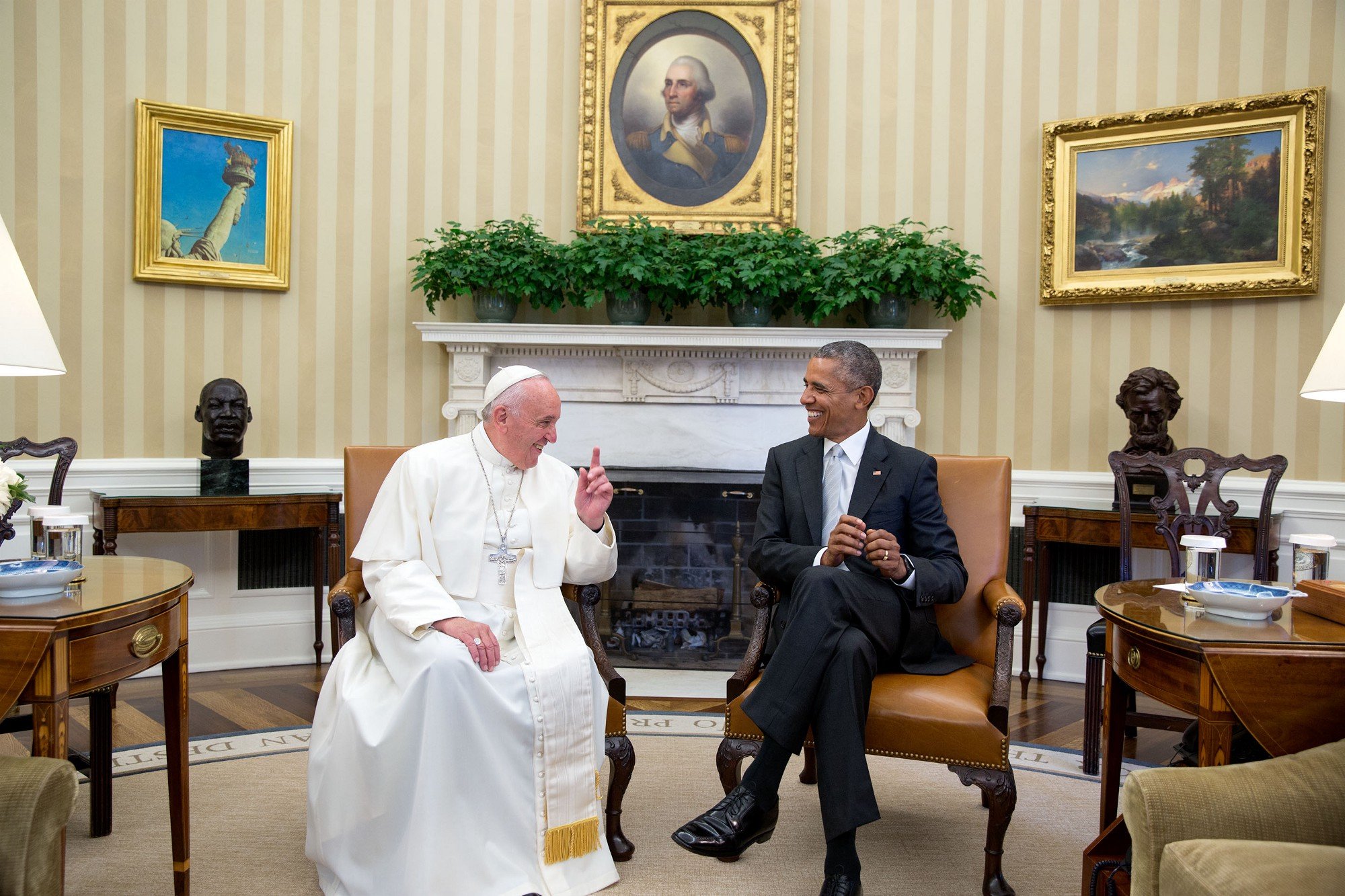Pope Francis’s modernising reforms: heartfelt change or image control?
Pope Francis meeting with President Obama in 2015 / Photo Courtesy: Wikimedia Commons
Since his election in 2013, Pope Francis has proved a controversial figure, perhaps most of all amongst Catholics. He has shown a strong will to reform the Church and take a hard look at its mistakes. Whilst he sparks outrage amongst conservatives, many left-leaning people, Catholics or not, have felt his activism was performative and shallow.
Far-right conservatives take malicious delight in spreading anti-immigration racist theories like that of the “Great Replacement”, indulging in an absurd anti-“woke” moral panic to defend the West’s “Christian values” (whatever that means). Pope Francis’ consistent advocacy for immigrants’ right to freedom, dignity and hospitality irritates Catholics from this milieu. During his last visit to Marseille, he insisted on the importance of the “conviviality of differences”, denouncing European governments’ culpability in tragic deaths of immigrants at sea and politicians’ abject weaponization of a lexicon of invasion and urgency. Emphasising the duty to welcome, protect, help and integrate, the Pope reminded Catholics that the Holy Family once sought refuge in Egypt too, criticising “sterile assimilationist” policies such as France’s; imagine that…
Pope Francis has also worked towards the recognition of pedocriminal abuses within the Church, thus breaking a major taboo, envisaged the blessing of homosexuals couples, and recently affirmed the right of queer and trans people to be baptised, godparents and wedding witnesses - granted, it was never written anywhere that they could not, but it still sparked outrage amongst bigots.
French conservatives have been using inventive language against the Pope for years: Islamo-Gauchiste, vicary of the left, humanist without God, naive immigrationist utopist, to name just a few. Other Western far-right discourses are not to be outdone: Salvini has established himself as the answer to ultraconservative Italians’ hatred of the Pope, Fox News famously called him “the Catholic Church’s Obama”, and outlets such as Lifesite feed into conspiracy theories on his very legitimacy. Ironically, to better defend our “Christian values”, these fundamentalist seem to find no issue with challenging the Catholic Catechism’s papal primacy principle.
Is the Pope indeed a dangerously radical and heretical leftist? Not quite. Whilst his efforts to address issues like immigrants’ rights, Islamophobia, far-right politics, nationalism, sustainability, and the Church’s past crimes remain significant, they show clear limits. In Marseille, he firmly defended immigrants, but he also strongly reaffirmed the Church’s condemnation of abortion as a “fake right to progress that is in fact a regression”, later establishing a parallel with nazism and excoriating euthanasia - three positions that cannot quite be considered progressive.
Pope Francis in 2019 visiting St Louis Hospital, Bangkok / Photo Courtesy: Wikimedia Commons
Besides, to many LGBTQI+ Catholics, his timid steps towards inclusion feel lukewarm, at best, for queer Catholics hesitant to return to churches where their “homosexual acts” are condemned as “intrinsically disordered” and “serious depravity”, where their marital unions remain impossible, and where they inevitably endure pathologisation and marginalisation. Besides, the cordial invitation to life-long chastity to avoid the eternal fires of Hell is less than attractive to most... Pope Francis has previously reasserted the exclusion of women from priesthood, written eco-conscious manifestos that dangerously flirt with gender essentialism and pseudo-scientific discourses and, of course, forbids the use of contraception.
Sixty years after the Vatican II reforms, Pope Francis said “no to traditionalism and progressivism within the Church”. Defining both as “excesses that are acts of infidelity”, he established a deplorable parallelism between two radically different political movements, one of which is worryingly close to neofascism. Stemming from a will to be not from the world but in the world (John 17), Pope Francis is not trying to ‘modernise’ the Church, but to bring it closer to what he feels are the Scripture’s teachings, resulting in a sort of neither/nor situation. He is neither progressive nor entirely reactionary, neither the vicary of the left nor quite that of the far right.
However, I consider it essential to highlight that many critics of his insufficient reforms are (perhaps blissfully) unaware of just how dire the situation amongst conservative Catholics is. Growing up in an alt-right fundamentalist Catholic family, I have witnessed outraged resistance even to his most lukewarm stances first-hand. Pope Francis’ reforms, if not stemming from image control insofar as they do not grant him much sympathy amongst those he governs, have, by the merit of their existence, successfully angered many of the Church’s bigots. The violence of reactions such as Bishop Strickland’s (an ultra-conservative American priest the Pope recently fired) and the likes of him underlines just how direly needed these changes - although disappointing to progressives - sadly remain.


